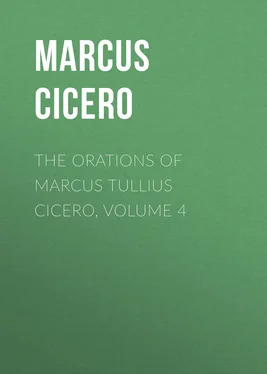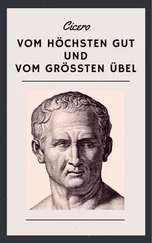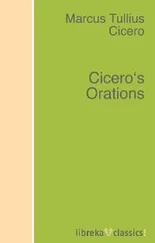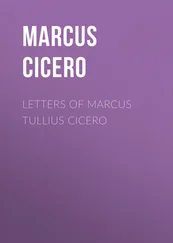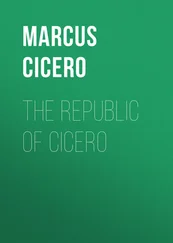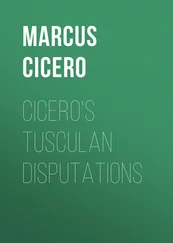Marcus Cicero - The Orations of Marcus Tullius Cicero, Volume 4
Здесь есть возможность читать онлайн «Marcus Cicero - The Orations of Marcus Tullius Cicero, Volume 4» — ознакомительный отрывок электронной книги совершенно бесплатно, а после прочтения отрывка купить полную версию. В некоторых случаях можно слушать аудио, скачать через торрент в формате fb2 и присутствует краткое содержание. Жанр: foreign_antique, Философия, foreign_edu, на английском языке. Описание произведения, (предисловие) а так же отзывы посетителей доступны на портале библиотеки ЛибКат.
- Название:The Orations of Marcus Tullius Cicero, Volume 4
- Автор:
- Жанр:
- Год:неизвестен
- ISBN:нет данных
- Рейтинг книги:3 / 5. Голосов: 1
-
Избранное:Добавить в избранное
- Отзывы:
-
Ваша оценка:
- 60
- 1
- 2
- 3
- 4
- 5
The Orations of Marcus Tullius Cicero, Volume 4: краткое содержание, описание и аннотация
Предлагаем к чтению аннотацию, описание, краткое содержание или предисловие (зависит от того, что написал сам автор книги «The Orations of Marcus Tullius Cicero, Volume 4»). Если вы не нашли необходимую информацию о книге — напишите в комментариях, мы постараемся отыскать её.
The Orations of Marcus Tullius Cicero, Volume 4 — читать онлайн ознакомительный отрывок
Ниже представлен текст книги, разбитый по страницам. Система сохранения места последней прочитанной страницы, позволяет с удобством читать онлайн бесплатно книгу «The Orations of Marcus Tullius Cicero, Volume 4», без необходимости каждый раз заново искать на чём Вы остановились. Поставьте закладку, и сможете в любой момент перейти на страницу, на которой закончили чтение.
Интервал:
Закладка:
But why should I seek to make an impression on you by my speech? For, if the end of Caius Caesar cannot influence you to prefer being loved to being feared, no speech of any one will do any good or have any influence with you; and those who think him happy are themselves miserable. No one is happy who lives on such terms that he may be put to death not merely with impunity, but even to the great glory of his slayer. Wherefore, change your mind, I entreat you, and look back upon your ancestors, and govern the republic in such a way that your fellow-citizens may rejoice that you were born; without which no one can be happy nor illustrious.
XV. And, indeed, you have both of you had many judgments delivered respecting you by the Roman people, by which I am greatly concerned that you are not sufficiently influenced. For what was the meaning of the shouts of the innumerable crowd of citizens collected at the gladiatorial games? or of the verses made by the people? or of the extraordinary applause at the sight of the statue of Pompeius? and at that sight of the two tribunes of the people who are opposed to you? Are these things a feeble indication of the incredible unanimity of the entire Roman people? What more? Did the applause at the games of Apollo, or, I should rather say, testimony and judgment there given by the Roman people, appear to you of small importance? Oh! happy are those men who, though they themselves were unable to be present on account of the violence of arms, still were present in spirit, and had a place in the breasts and hearts of the Roman people. Unless, perhaps, you think that it was Accius who was applauded on that occasion, and who bore off the palm sixty years after his first appearance, and not Brutus, who was absent from the games which he himself was exhibiting, while at that most splendid spectacle the Roman people showed their zeal in his favour though he was absent, and soothed their own regret for their deliverer by uninterrupted applause and clamour.
I myself, indeed, am a man who have at all times despised that applause which is bestowed by the vulgar crowd, but at the same time, when it is bestowed by those of the highest, and of the middle, and of the lowest rank, and, in short, by all ranks together, and when those men who were previously accustomed to aim at nothing but the favour of the people keep aloof, I then think that, not mere applause, but a deliberate verdict. If this appears to you unimportant, which is in reality most significant, do you also despise the fact of which you have had experience,—namely, that the life of Aulus Hirtius is so dear to the Roman people? For it was sufficient for him to be esteemed by the Roman people as he is; to be popular among his friends, in which respect he surpasses everybody; to be beloved by his own kinsmen, who do love him beyond measure; but in whose case before do we ever recollect such anxiety and such fear being manifested? Certainly in no one's.
What, then, are we to do? In the name of the immortal gods, can you interpret these facts, and see what is their purport? What do you think that those men think of your lives, to whom the lives of those men who they hope will consult the welfare of the republic are so dear? I have reaped, O conscript fathers, the reward of my return, since I have said enough to bear testimony of my consistency whatever event may befall me, and since I have been kindly and attentively listened to by you. And if I have such opportunities frequently without exposing both myself and you to danger, I shall avail myself of them. If not, as far as I can I shall reserve myself not for myself, but rather for the republic. I have lived long enough for the course of human life, or for my own glory. If any additional life is granted to me, it shall be bestowed not so much on myself as on you and on the republic.
THE SECOND SPEECH OF M.T. CICERO AGAINST MARCUS ANTONIUS
This second speech was not actually spoken at all. Antonius was greatly enraged at the first speech, and summoned another meeting of the senate for the nineteenth day of the month, giving Cicero especial notice to be present, and he employed the interval in preparing an invective against Cicero, and a reply to the first Philippic. The senate met in the temple of Concord, but Cicero himself was persuaded not to attend by his friends, who were afraid of Antonius proceeding to actual violence against him, (and indeed he brought a strong guard of armed men with him to the senate) He spoke with the greatest fury against Cicero, charging him with having been the principal author and contriver of Caesar's murder, hoping by this to inflame the soldiers, whom he had posted within hearing of his harangue.
Soon after this, Cicero removed to a villa near Naples for greater safety, and here he composed this second Philippic, which he did not publish immediately, but contented himself at first with sending a copy to Brutus and Cassius, who were much pleased with it.
I. To what destiny of mine, O conscript fathers, shall I say that it is owing, that none for the last twenty years has been an enemy to the republic without at the same time declaring war against me? Nor is there any necessity for naming any particular person; you yourselves recollect instances in proof of my statement. They have all hitherto suffered severer punishments than I could have wished for them; but I marvel that you, O Antonius, do not fear the end of those men whose conduct you are imitating. And in others I was less surprised at this. None of those men of former times was a voluntary enemy to me; all of them were attacked by me for the sake of the republic. But you, who have never been injured by me, not even by a word, in order to appear more audacious than Catiline, more frantic than Clodius, have of your own accord attacked me with abuse, and have considered that your alienation from me would be a recommendation of you to impious citizens.
What am I to think? that I have been despised? I see nothing either in my life, or in my influence in the city, or in my exploits, or even in the moderate abilities with which I am endowed, which Antonius can despise. Did he think that it was easiest to disparage me in the senate? a body which has borne its testimony in favour of many most illustrious citizens that they governed the republic well, but in favour of me alone, of all men, that I preserved it. Or did he wish to contend with me in a rivalry of eloquence? This, indeed, is an act of generosity; for what could be a more fertile or richer subject for me, than to have to speak in defence of myself, and against Antonius? This, in fact, is the truth. He thought it impossible to prove to the satisfaction of those men who resembled himself, that he was an enemy to his country, if he was not also an enemy to me. And before I make him any reply on the other topics of his speech, I will say a few words; respecting the friendship formerly subsisting between us, which he has accused me of violating,—for that I consider a most serious charge.
II. He has complained that I pleaded once against his interest. Was I not to plead against one with whom I was quite I unconnected, in behalf of an intimate acquaintance, of a dear friend? Was I not to plead against interest acquired not by hopes of virtue, but by the disgrace of youth? Was I not to plead against an injustice which that man procured to be done by the obsequiousness of a most iniquitous interposer of his veto, not by any law regulating the privileges of the praetor? But I imagine that this was mentioned by you, in order that you might recommend yourself to the citizens, if they all recollected that you were the son-in-law of a freedman, and that your children were the grandsons of Quintus Fadius a freedman.
Читать дальшеИнтервал:
Закладка:
Похожие книги на «The Orations of Marcus Tullius Cicero, Volume 4»
Представляем Вашему вниманию похожие книги на «The Orations of Marcus Tullius Cicero, Volume 4» списком для выбора. Мы отобрали схожую по названию и смыслу литературу в надежде предоставить читателям больше вариантов отыскать новые, интересные, ещё непрочитанные произведения.
Обсуждение, отзывы о книге «The Orations of Marcus Tullius Cicero, Volume 4» и просто собственные мнения читателей. Оставьте ваши комментарии, напишите, что Вы думаете о произведении, его смысле или главных героях. Укажите что конкретно понравилось, а что нет, и почему Вы так считаете.
